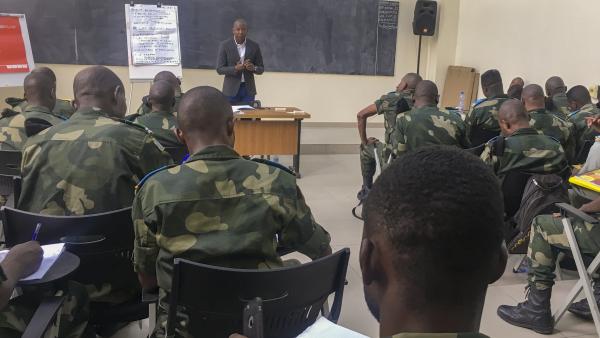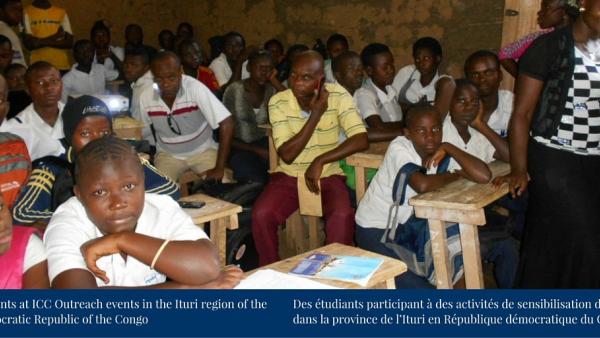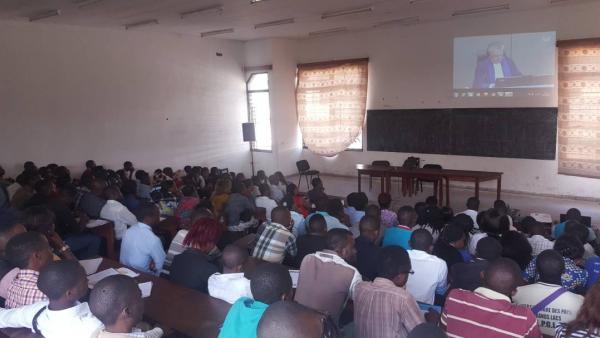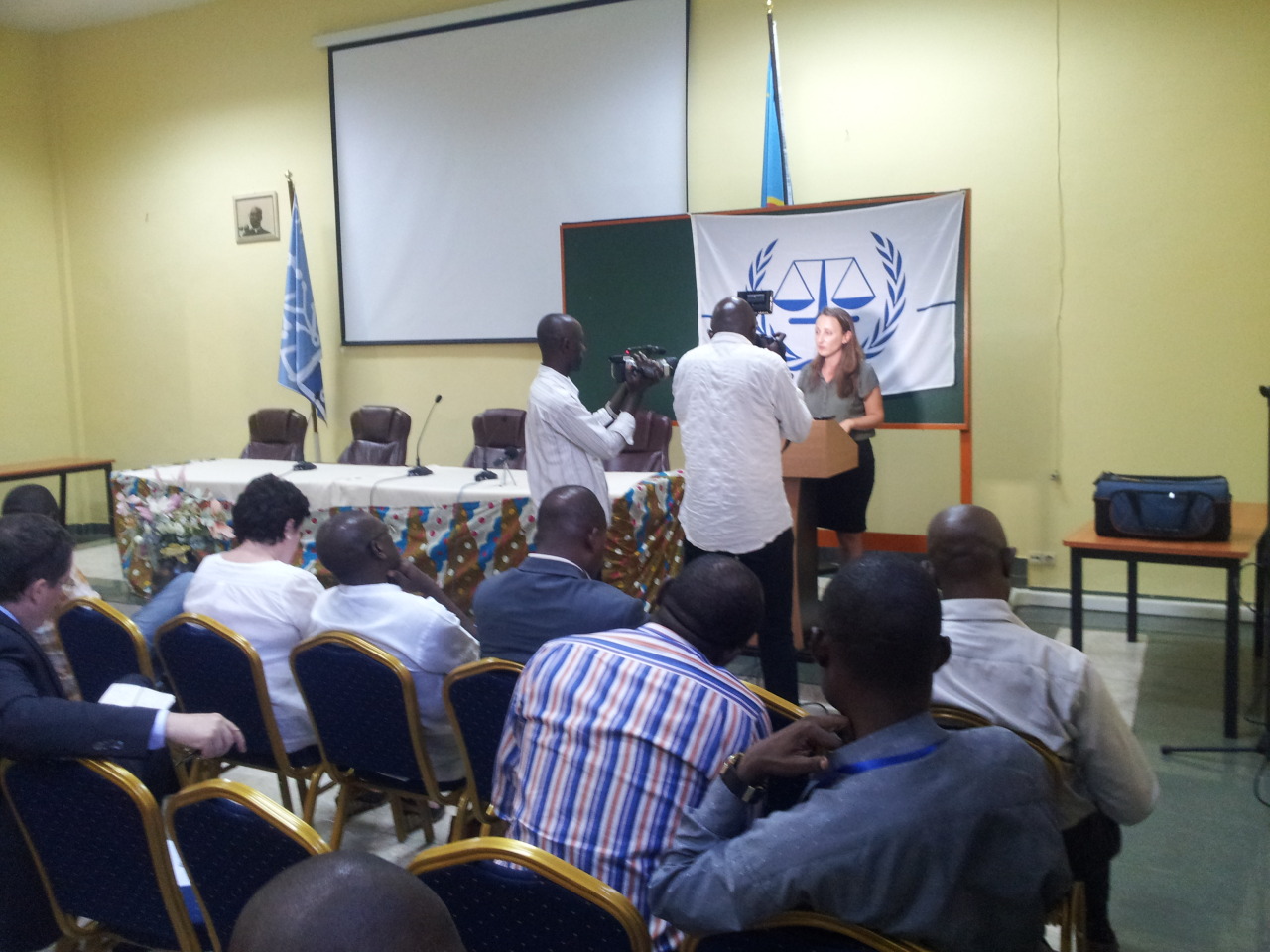
Looking forward, looking back: ICC Bemba case continues
With Margot Tedesco
Now that the Bemba case is facing both appeals and reparations proceedings, we’ve hardly had time to catch our breath from the verdict and sentence. At once looking forward but also back at the last few intense months of the trial, one key moment stands out.
My mind goes back to the verdict:
Kinshasa. 16:15 p.m. I have just entered the hall we have rented for the occasion, my hands full of press releases. Our office is not suited for such events. Patrick, my colleague, meets me. “Margot, some of the journalists have been here since three.” “The invitations did say 16:30.” Invitations had been texted at noon. Thankfully, we had arranged for a water dispenser. The hall is half full. Patrick had arrived earlier to get it ready. The ICC flag is up. The chairs are arranged. The public address system is set up. The hall is filling up gradually. In 15 minutes we will start the press conference.
A little under one hour earlier, the verdict in The Prosecutor v. Jean-Pierre Bemba Gombo was delivered in The Hague. The hearing had hardly ended, around 2:30 p.m., when my phone started ringing. “Come to the press conference, I will answer all your questions,“ I told the journalists over the phone. I had had little time to read and take in the decision, draft the text I would read out, print the press releases and get to the press conference. I needed to concentrate.
Contrary to my first press conference with the ICC, this time around I did not need to prepare the Case. I know it by heart. June 2008: arrest; November 2010: commencement of proceedings; November 2014: Closing Statements; charged with three counts of war crimes, two counts of crimes against humanity. 5229 victim participants; 2004: the Central African Republic seized the Court.
The Chamber had scheduled the hearing to start at 14:00 p.m. The duration of hearings is unpredictable. However, we thought it reasonable to schedule a press conference at 16:30. Had we planned for later, few journalists or none at all would have attended. Had the hearing lasted longer than expected, we would have had to make them wait. Too bad. We need at least 30 minutes to prepare. We cannot do otherwise. We have to make sure that they have all the information they need very quickly, in the hope that they would have time to include it in the evening news. Those are the kind of difficulties and uncertainties we have to deal with when hearings are held in the afternoon. Fortunately, at this time of year we are in the same time zone as The Hague. In Bunia, eastern Congo, which is one hour ahead, the press conference could not be held on the same day, so it was held the following day.
Five minutes. In five minutes we will begin. I glance through the roster. A quick headcount. 25, possibly 30 journalists. I recognise some of them although some I know are absent. There are also other people, in particular, representatives of Embassies including that of the Central African Republic (CAR) in the DRC. Although I had expected a slightly bigger turnout, the most important people are here.
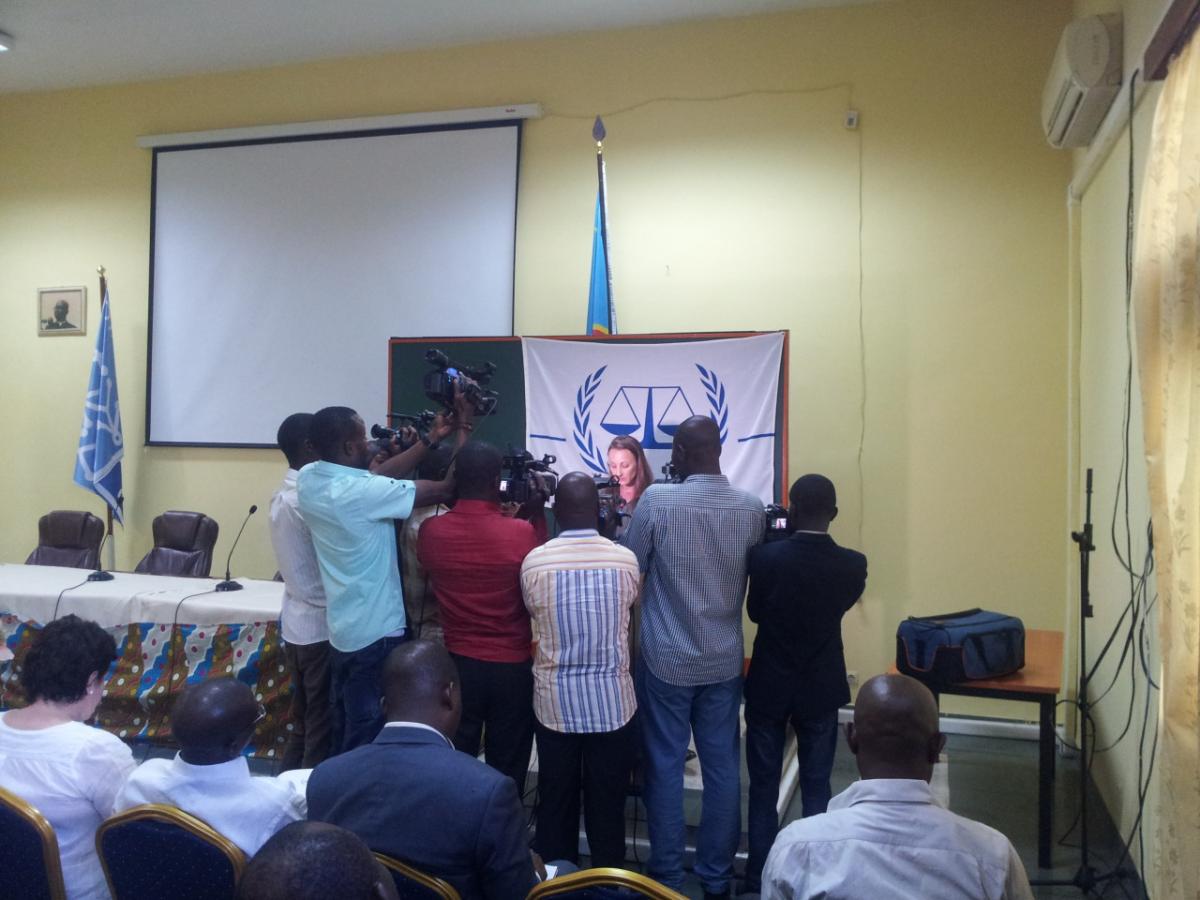
The Chief of the Field Office approaches me. “We just received an e-mail with the Prosecutor’s statement on the verdict,” he tells me, handing me his telephone. Too late, we will not be able to hand out copies straight after the conference. I will distribute the statement by e-mail when I get back to the office. I peruse the statement and note one or two paragraphs to read out at the end of the conference, so the journalists can return to their newsrooms with as much information as possible. The journalists’ Internet access is unreliable. Whenever possible, we hand out hard copies.
Jean-Pierre Bemba was not tried for crimes committed in the DRC, but rather for crimes committed in the CAR. He is Congolese and a leading politician in the DRC. The atmosphere in the room is therefore quite unlike how it had been at the commencement of proceedings against Bosco Ntaganda. A wall of cameras and microphones is lined up in front of me. I read out the text I have prepared announcing the verdict. First question: I am unable to see where the question is coming from; I only hear a voice. I can no longer see anyone, only the wall of cameras half a metre away. Some of the journalists appear to be disappointed by the verdict. I can tell from the questions they are asking. Sometimes I am able to peak through a gap between cameras to take a look at the person who has asked me the question. Whether or not they like the decisions of the Court is irrelevant. Our duty is to transmit the Chamber’s explanation of their decision in a meaningful, accessible way.
The following day, the verdict is front-page news in the Kinshasa press. I read the headlines from roadside newspaper vendors at the traffic lights. “Madam, yesterday I saw you on television,” a woman tells me on the street. “How was it? Was I clear? Did you understand?” “Oh! I can’t make head or tail of that legal stuff,” she answers. I vowed to take up the challenge and up my game – to make the ICC more accessible to those in the DRC.
Over the next weeks, we monitored the press to see how the information was reported, and fixed minor mistakes and inaccuracies. This helped us pinpoint messages requiring more detail when we stage events and in any future training for journalists. In this case, no major mistakes had been made. There were a few inaccuracies and some confusion in the use of legal jargon, but for the most part, the journalists were getting things right.
Since that moment, we’ve witnesses the sentence – Mr Bemba was sentenced to 18 years – and now the case will enter appeals and reparations. As important as these hearings will be for communities affected by crimes, no moment will stand out stronger for me as the decision on the guilt of the accused. We will continue to follow the proceedings and inform the affected communities, and, as needed, meet the press at key moments of the case.
